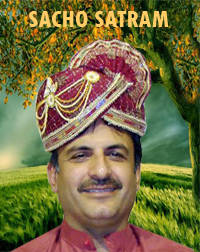During a profound satsang by Hazir Swaroop Sai Sadhram Sahib, he explained on why parents invariably prioritise their children’s welfare, strive to provide optimal nurturing, and harbour aspirations for their children to embody qualities of affection, compassion, and intellect. He emphasised that parents recognise the crucial role their children will play in shaping their own sense of worth, esteem, and dignity in the future, and understand that these values will serve as the foundation for their children’s own journey ahead.
This is why parents provide a conscientious upbringing for their children.
Sai Sadhram Sahib elucidated that families mark the sixth day of their child’s life with a special celebration, during which all guests apply a milk tilak on the child’s forehead and delicately touch their lips with a finger dipped in milk.
The tradition of applying a milk tilak on the child’s forehead symbolises a profound gesture. Milk, renowned for its purity, represents the transition of the child from various life forms to human existence. By welcoming the child with pure milk, it’s a blessing for them to lead a virtuous and healthy life in their current human incarnation.
Touching the child’s lips with pure milk-dipped fingers signifies bestowing blessings upon the child, wishing that they always speak with respect and kindness, recognizing the profound influence of spoken words on one’s life journey.
It is often expressed that spoken words possess the ability to elevate a person to a higher position or to humble them to the ground.
For instance, while both the cuckoo and the crow may appear similar in appearance, their sounds are distinctly different. The melodious call of the cuckoo is universally cherished, whereas the harsh cawing of the crow tends to irritate people.
Saijan elaborated that anything ingested through our mouths directly impacts our bodies. Just as pure milk influences our physical well-being, the purity of our spoken words shapes our character over a lifetime. Therefore, when people bless a child by touching milk-dipped fingers to their lips, it symbolises a wish for the child to develop an inner character as pure and virtuous as milk, fostering inner strength and wisdom rather than merely projecting an external façade to the world.
Saijan remarked that although a six-day-old child may not comprehend the significance of the ritual performed on the sixth day, it is primarily intended for the elders present.
The true purpose of commemorating the sixth day of a child’s birth with the milk ritual is intended for the elderly individuals. This ritual serves as a reminder to them that they should refrain from speaking negatively to the child, strive to lead a righteous life, and maintain a nurturing environment within the household for the child’s optimal upbringing.
Maintaining a positive atmosphere and speaking respectfully within the household is crucial, as children learn by observing the behavior of family members. They not only pick up the language spoken by elders but also emulate the conduct of those around them.
We must always bear in mind that what we give will eventually return to us.
We often find that while we may not pay much attention to our own actions, the actions of our children deeply impact us.
We find it intolerable when our children speak disrespectfully to us.
The issue arises from our own actions under the guise of modern ideologies.
By considering our children as our friends, we have compromised our self-respect.
It’s lamentable that in today’s era, we label our children as friends, shirking our parental responsibilities and allowing them free rein, neglecting our duty to instil strong character traits in them.
We fail to recognise that when we treat our children as friends, they may eventually reciprocate by speaking to us casually and without respect. This can deeply hurt us, prompting us to revert to a parental role and correct their behaviour. However, we often overlook the fact that it was our own fault for blurring the boundaries between parent and friend as they were growing up. By neglecting our parental responsibilities and avoiding the establishment of a respectful distance, we inadvertently allow our children to take liberties and treat us as equals.
Hazir Swaroop Sai Sadhram Sahib stresses the importance of recognising that avoiding our responsibilities will inevitably lead to consequences and eventual destruction.
Sacho Satram



